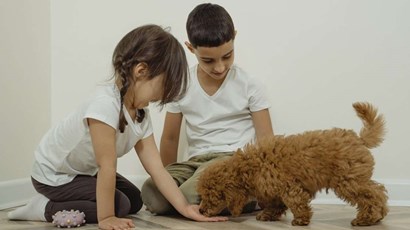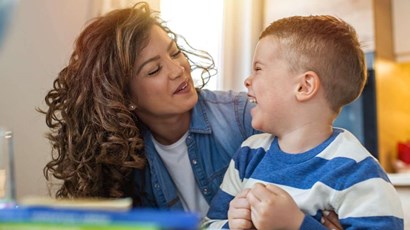Autistic Spectrum Disorders ASDs
Autistic spectrum disorders (ASDs) affect the way a person communicates with, and relates to, other people. People with autistic spectrum disorders usually need specialist care and education.
Many people feel that autism should not be called a disorder. The term autistic spectrum condition is therefore sometimes used instead of autistic spectrum disorder.
What is ASD?
ASD stands for autistic spectrum disorder. Autistic spectrum disorders are a group of similar disorders with varying degrees of severity. Autistic people share certain difficulties but there is a spectrum of severity from mild to severe. The term Asperger's syndrome is no longer used.
Is ASD a learning disability?
ASD is not a learning disability but many autistic people also have learning disabilities. People with autism may have specific learning difficulties (eg, dyslexia). Autistic people may also have difficulties with understanding and processing language.
Debunking autism myths
A YouGov poll commissioned by charity Autistica revealed a wide lack of understanding and knowle...
What are the signs of ASD?
Autistic spectrum disorders usually become apparent in the first three years of life. Half of parents become concerned in the first 12 months and seek early intervention. Some children are only diagnosed after they have started school, and, but very rarely, not until they become adults.
The symptoms of ASD vary between people. Some autistic people have minimal symptoms whereas others may have severe difficulties.
For children, the signs that indicate the possibility of ASD include:
- Difficulties with spoken language, such as language delay or limited use of language. Autistic children may not be able to express themselves well, may repeat or echo words that they hear back to you, time and time again (this is called echolalia), and may tend to always take words and phrases literally, even when words and phrases are not meant to be taken literally.
- Difficulties responding to others, such as avoiding eye contact, not responding when their name is called, or not responding to other people's facial expressions or feelings.
- Difficulty interacting with others. Autistic children may seem to be aloof, have little or no interest in other people, resulting in having no real friends, and prefer being alone.
- Pointing and other gestures, such as using pointing at or showing objects to share an interest.
- Ideas and imagination, reduced imagination and variety of play. Games and activities tend to be repeated over and over again (repetitive behaviours). Therefore games and activities may remain exactly the same every day.
- Becoming upset if routines are changed.
- Unusual or restricted interests and/or rigid and repetitive behaviours.
- Excessive reactions, such as to taste, smell, texture or the appearance of food. Autistic children may have extreme food fads.
Parents often find these problems very confusing and may become frustrated as they can heavily affect their daily lives.
Seizures (epilepsy) occur in around 3 in 10 cases. This usually happens for the first time around puberty. Seizures usually happen in children who are severely affected by autism spectrum disorders.
ASD in adults
For adults, the diagnosis of ASD can be difficult but should be considered when a person has:
- Persistent difficulties in social interaction, getting very anxious about social situations, avoiding eye contact, and talking over people. Getting too close to other people, or getting very upset if someone touches or gets too close to them.
- Persistent difficulties in social communication, such as finding it hard to say how they feel, finding it hard to understand what others are thinking or feeling, seeming to be blunt, rude or not interested in others.
- Always taking things very literally.
- Rigid and repetitive behaviours, resistance to change, or restricted interests. Having the same routine every day and feeling unable to cope with any change. Wanting to plan everything very carefully.
- Being very sensitive to patterns, smells or sounds.
- Finding it hard to make friends or preferring to be on their own.
- Persistent and recurrent problems in obtaining or sustaining employment or education.
How many people have ASD?
Around one in 100 children have ASD. ASD is more commonly diagnosed in boys but this may be mainly because autism is often harder to spot in girls and so girls with autism are more often not diagnosed and therefore overlooked.
What causes autistic spectrum disorders?
The cause of autistic spectrum disorders is not really known. There is some evidence that they may be genetic conditions passed down in families. Twins and siblings of children with ASD have a higher chance of also being autistic.
There are also some developmental disability conditions in which ASD is more common. Risk factors include Down's syndrome, Tourette's syndrome and tuberous sclerosis.
How are autistic spectrum disorders diagnosed?
All children have a series of child health checks to ensure they are developing normally. At these checks you will be asked if you have any concerns. If you have noticed, for instance, that your child doesn't always look at you, or doesn't point to show you things, or doesn't wave or clap - you should mention it. Your health visitor or doctor may then ask you a few questions and watch your child. They may want your child to have a hearing test. Sometimes hearing problems can make it difficult for a child to be sociable.
If they are concerned about ASD they may ask a specialist team to observe your child. This team will normally be made up of several different types of health professional. They will observe your child over a period of time before making a decision about the diagnosis. Their observations decide whether your child has an ASD.
Blood tests may be taken. These do not test for an ASD but help to look for and rule out other conditions that may seem similar.
How is ASD treated and managed?
Children with ASD
Specialist education and support aim to help with language, social skills and communication skills. Most children with ASD are under the care of a child specialist. Other people will also offer support. They might be speech and language therapists, occupational therapists and educational psychologists. The types of treatments offered will depend on the needs of each individual autistic person.
The help and support that may be offered includes:
- Psychosocial interventions, including play-based strategies with parents, carers and teachers, with strategies to expand communication, interactive play and social routines.
- Parent-mediated interventional programmes to help families interact with their child, to improve the child's development and increase parental satisfaction, empowerment and mental health.
- Behavioural and developmental programmes to improve overall functioning, address specific behavioural difficulties, such as sleep disturbance, and improve behaviours such as adaptive skills and initiating social contact with peers.
- Early intensive behavioural intervention (EIBI) programmes with a structured learning programme that takes into account the specific needs of each child.
- Speech and language therapy is most effective when speech and language therapists also train and work with teachers, families and peers to improve communication in normal environments.
- Interventions to support social skills (attention, interactive play, responding to social overtures and initiating and maintaining social behaviours).
- Occupational therapy, including sensory integration therapy to help sensory perception issues such as oversensitivity to touch, helping the development and maintenance of fine motor and adaptive skills, and providing advice and support in adapting environments, activities and routines in daily life.
- Music therapy may help improve skills such as social interaction and verbal communication.
- Advice on diet and food intake from a dietician may be needed if there are significant food selectivity and dysfunctional feeding behaviours, or restricted diets that may cause nutritional deficiencies.
- Interventions for life skills, such as coping strategies and accessing community services, including developing skills to access public transport, employment and leisure facilities.
- Interventions for sleep problems, including identifying the nature of the sleep problem and any underlying factors, such as day and night sleep patterns, and any change to those patterns, whether bedtime is regular, and what the sleep environment is like. A sleep plan may be used to help address the identified sleep problems and to establish a regular night-time sleep pattern. Ask the parents or carers to record the child or young person's sleep and wakefulness throughout the day and night over a two-week period. Use this information to modify the sleep plan if necessary and review the plan regularly until a regular sleep pattern is established.
Adults with ASD
The help and support for adults with autism will depend on the individual needs of each individual but may include:
- Psychosocial interventions for adaptive behaviours, communication, social skills, employment, quality of life and any mental health difficulties.
- Social programmes to help improve any communication or behavioural difficulties.
- Interventions to improve emotional literacy, distress tolerance, relaxation skills or general adjustment.
For children and adults with autism, medication does not have a role in treating the core symptoms of autism but may be considered to help with specific ASD-related problems if other ways of coping aren't working. Therefore medication may be considered to help treat associated mental health problems such as anxiety, depression, obsessive-compulsive disorder, challenging behaviour or sleep problems. Medications are only used alongside non-medication treatments and never as the only treatment.
What is the outlook for ASD?
Autistic spectrum disorder is a lifelong condition. As the severity can vary, it is difficult to predict the outcome (prognosis) for each child.
Some adults with autistic spectrum disorder manage to work and get by with just a little support. However, some autistic people need substantial support.
Further reading and references
Autism in under 19s: recognition, referral and diagnosis; NICE Clinical Guideline (September 2011 - last updated December 2017)
Autism in under 19s: support and management; NICE Clinical Guideline (August 2013 - last updated June 2021)
SIGN 145 Assessment diagnosis and interventions for autism spectrum disorders; Scottish Intercollegiate Guidelines Network - SIGN (2016, revalidated August 2019)
Autism in adults, NICE Clinical Guideline (June 2012, last updated June 2021)
Autism; a booklet for adults, partners, friends, family members and carers, Scottish Intercollegiate Guidelines Network (SIGN)







